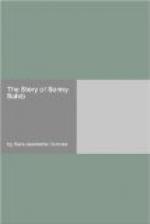As to Sonny Sahib’s mother, she was neither shot in the boats with the soldiers that believed the written word of the Nana Sahib, nor stabbed with the women and children who went back to the palace afterwards. She died quietly in the oxcart before it reached the ghat, and the pity of it was that Sonny Sahib’s father, the captain, himself in hospital four hundred miles from Cawnpore, never knew.
There is a marble angel in Cawnpore now, standing in a very quiet garden, and shut off even from the trees and the flowers by an enclosing wall. The angel looks always down, down, and such an awful, pitiful sorrow stands there with her that nobody cares to try to touch it with words. People only come and look and go silently away, wondering what time can have for the healing of such a wound as this. There is an inscription—
Sacred to the perpetual memory of A large company of Christian people, chiefly women and children, who near this Spot were cruelly murdered by the followers of the Rebel Nana DHUNDU pant of BITHUR, and Cast, the dying with the dead, into the well below, on the XVTH day of July MDCCCLVII.’
And afterward Sonny Sahib’s father believed that all he could learn while he lived about the fate of his wife and his little son was written there. But he never knew.
CHAPTER II
Tooni and Abdul heard the terrible news of Cawnpore six months later. They had gone back to their own country, and it was far from Cawnpore—hundreds and hundreds of miles across a white sandy desert, grown with prickles and studded with rocks—high up in the north of Rajputana. In the State of Chita and the town of Rubbulgurh there was no fighting, because there were no Sahibs. The English had not yet come to teach the Maharajah how to govern his estate and spend his revenues. That is to say, there was no justice to speak of, and a great deal of cholera, and by no means three meals a day for everybody, or even two. But nobody was discontented with troubles that came from the gods and the Maharajah, and talk of greased cartridges would not have been understood. Thinking of this, Abdul often said to Tooni, his wife; ’The service of the sahib is good and profitable, but in old age peace is better, even though we are compelled to pay many rupees to the tax-gatherers of the Maharajah.’ Tooni always agreed, and when the khaber came that all the memsahibs and the children had been killed by the sepoys, she agreed weeping. They were always so kind and gentle, the memsahibs, and the little ones, the babalok—the babalok! Surely




